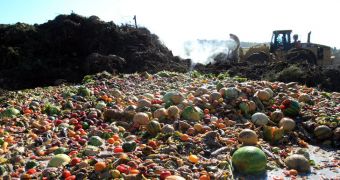This April 15, Wales cut the ribbon on a food waste anaerobic digestion plant. The facility is located in Llwyn Isaf, close to the town of Caernarfon, and will serve to process food waste and roll out clean energy.
Information shared with the public says that the anaerobic digestion plant is part of a larger recycling facility. Once up and running at full capacity, it will serve to help the country deal with food waste in an eco-friendly manner.
First Minister Carwyn Jones explains that, presently, Wales is the only country in the United Kingdom to have taken steps towards ensuring that food waste does not get sent to landfill and is instead put to better use.
“Wales is the only country in the UK with a national program to address household food waste, and we have provided leadership to local government and the market with our ambitions, as well as significant funding,” the First Minister said in a statement.
Thus, this new anaerobic digestion plant in Llwyn Isaf, near Caernarfon, is expected to help the country make further progress in terms of promoting sustainability by properly handling food waste, Business Green informs.
Specialists estimate that, all in all, the facility will be able to take in and process about 11,000 tonnes of waste on a yearly basis. In doing so, it will roll out some 3,500 megawatt hours of clean energy, and it will also cough out noteworthy amounts of fertilizer.
“Thanks to Prosiect GwyriAD, 11,000 tonnes of waste a year will avoid landfill, where it would generate greenhouse gas emissions. Instead, the plant has created jobs locally and generates 3,500 megawatt hours of renewable electricity for the national grid,” First Minister told the press in a recent interview.
“As well as processing more than 150 tonnes of household food waste every week in a sustainable and responsible manner, the GwyriAD plant will also produce natural biofertiliser to be used on local farmland and produce green electricity,” added Councilor Gareth Robert.
By the looks of it, the costs associated with building this food waste anaerobic digestion plant amounted to £6 million (roughly €7.25 million / $10 million). The Welsh government is said to have supported this green-oriented project by means of a £2.4 million (about €2.9 million / $4 million) grant.
Interestingly enough, it would appear that this facility is the first anaerobic digestion plant that has been built in Wales for the sole purpose of processing food waste.

 14 DAY TRIAL //
14 DAY TRIAL //